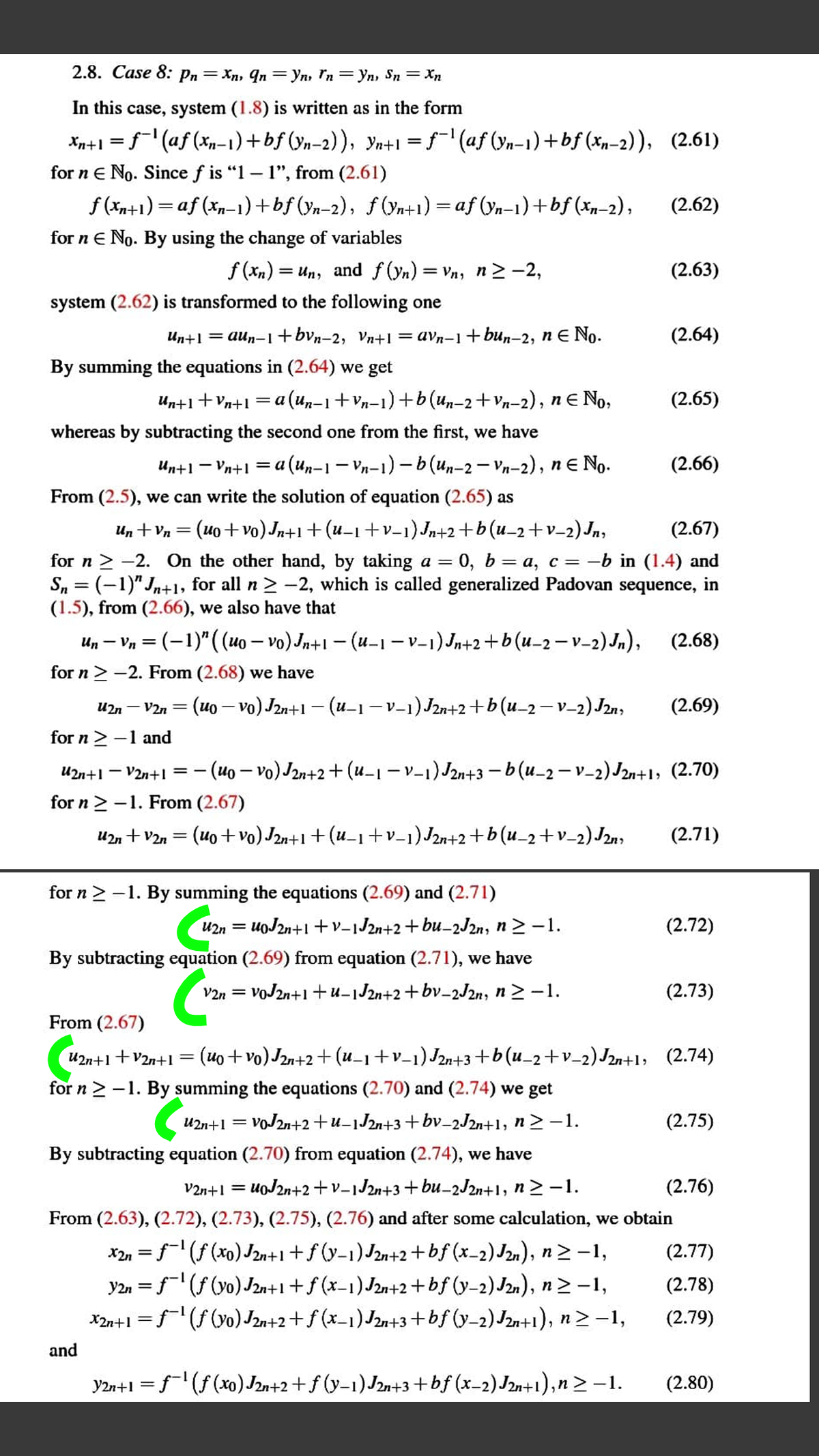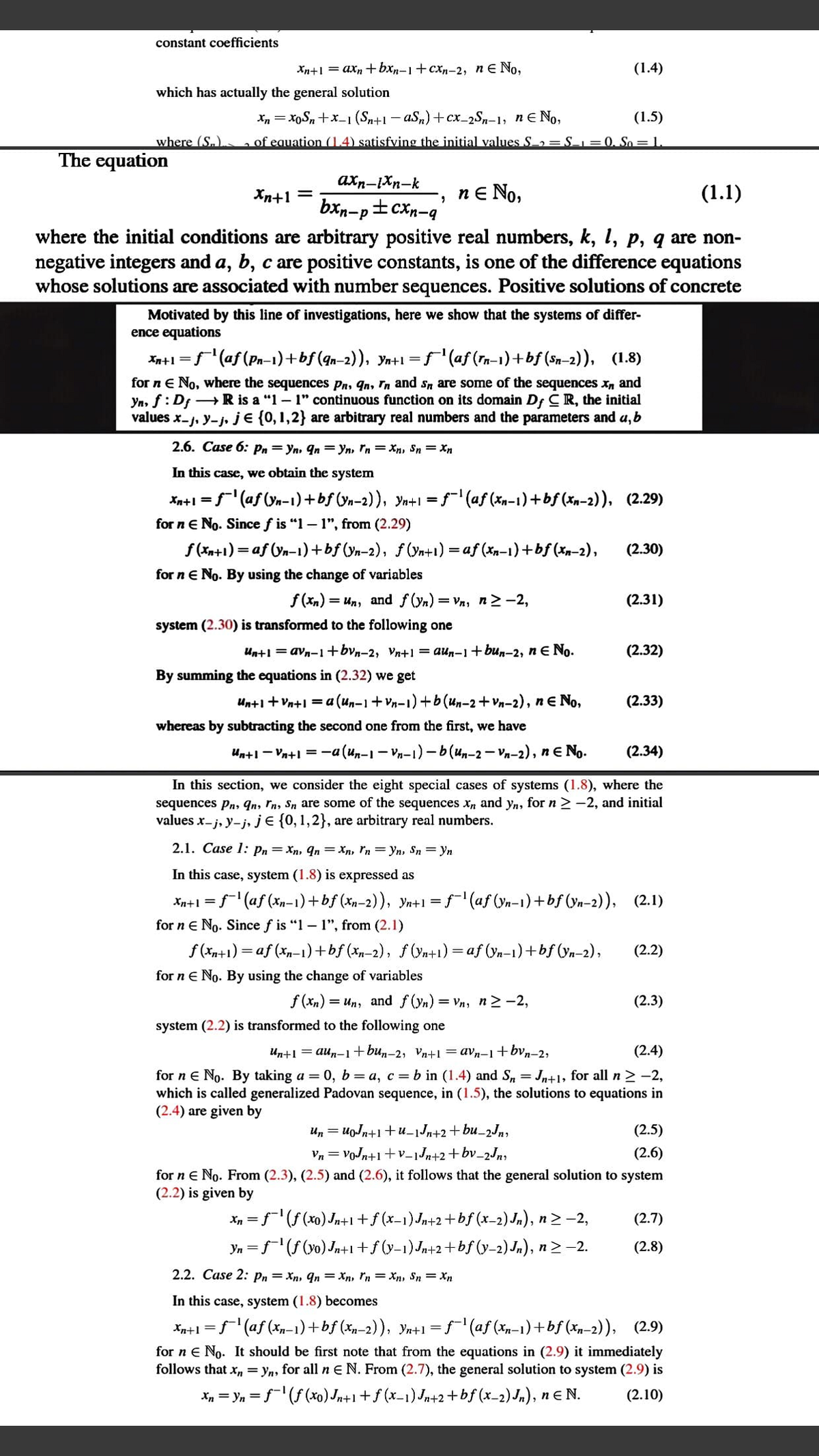for n>-1. By summing the equations (2.69) and (2.71) uzn = uoJ2n+1 +v-jJ2n+2+bu_2J2n, n> -1. (2.72) By subtracting equation (2.69) from equation (2.71), we have V2n = VoJ2n+1+ u-jJ2n+2+bv-2J2n, n > –1. (2.73) From (2.67) uzn+1+V2n+l = (uo+vo)J2n+2+(u_1 +v-1)J2n+3+b(u_2+v-2)J2n+1, (2.74) for n> -1. By summing the equations (2.70) and (2.74) we get U2n+1 = VOJ21+2+u-1J2n+3+bv_2J21+1, n> -1. (2.75) By subtracting equation (2.70) from equation (2.74), we have V2n+1 = uoJ2n+2+v-1J2n+3+bu-2J21+1, n> -1. (2.76) From (2.63), (2.72), (2.73), (2.75), (2.76) and after some calculation, we obtain X2n = f'(f (xo) J2n+1+f(y=1)J2n+2+bf (x-2)J2n), n> –1, (2.77)
for n>-1. By summing the equations (2.69) and (2.71) uzn = uoJ2n+1 +v-jJ2n+2+bu_2J2n, n> -1. (2.72) By subtracting equation (2.69) from equation (2.71), we have V2n = VoJ2n+1+ u-jJ2n+2+bv-2J2n, n > –1. (2.73) From (2.67) uzn+1+V2n+l = (uo+vo)J2n+2+(u_1 +v-1)J2n+3+b(u_2+v-2)J2n+1, (2.74) for n> -1. By summing the equations (2.70) and (2.74) we get U2n+1 = VOJ21+2+u-1J2n+3+bv_2J21+1, n> -1. (2.75) By subtracting equation (2.70) from equation (2.74), we have V2n+1 = uoJ2n+2+v-1J2n+3+bu-2J21+1, n> -1. (2.76) From (2.63), (2.72), (2.73), (2.75), (2.76) and after some calculation, we obtain X2n = f'(f (xo) J2n+1+f(y=1)J2n+2+bf (x-2)J2n), n> –1, (2.77)
Advanced Engineering Mathematics
10th Edition
ISBN:9780470458365
Author:Erwin Kreyszig
Publisher:Erwin Kreyszig
Chapter2: Second-order Linear Odes
Section: Chapter Questions
Problem 1RQ
Related questions
Question
show me the steps of determine green and all information is here

Transcribed Image Text:2.8. Case 8: Pn = Xn, qn=Yn, rn=Yn, Sn = Xn
In this case, system (1.8) is written as in the form
Xp+1 =f'(af (xg-1)+bf (Yn-2)), Yn+l =f"(af (yn-1)+bf (Xn-2)), (2.61)
for n E No. Since f is "1 – 1", from (2.61)
f (xn+1) = af (xn-1) +bf (yn-2), f (yn+1) = af (yn-1)+bf (xn-2),
(2.62)
for n E No. By using the change of variables
f (xn) =
= un, and f (yn) = Vn, n> -2,
(2.63)
system (2.62) is transformed to the following one
Un+1 = aun-1+bvn-2, Vn+1 = avn-1+ bun-2, n E No.
(2.64)
By summing the equations in (2.64) we get
Un+1+Vn+l = a(un-1+ Vn-1) +b(un-2+Vn-2), ne No,
(2.65)
whereas by subtracting the second one from the first, we have
Un+1 - Vn+1= a
(un-1 – Vn-1) – b (un-2 – Vn-2), n E No.
(2.66)
From (2.5), we can write the solution of equation (2.65) as
Un + Vn = (uo+ vo) Jn+1+(u-1+v-1) Jn+2+b (u_2+v–2) Jn,
(2.67)
for n > -2. On the other hand, by taking a = 0, b = a, c= -b in (1.4) and
S, = (-1)" Jn+1, for all n> -2, which is called generalized Padovan sequence, in
(1.5), from (2.66), we also have that
Un – Vn = (-1)" ( (u0 – vo) Jn+l – (u-1 – v-1) Jn+2+b (u-2 – v-2) Jn),
(2.68)
for n > -2. From (2.68) we have
U2n - V2n=
(4o – vo) J2n+1 - (u-1 – v–1) J2n+2+b (u-2 - v-2) J2n,
(2.69)
for n >-1 and
U2n+1 - V2n+1 =-
(40 - vo) J2n+2+(u-1 - v-1)J2n+3-b (u_2-v-2) J2n+1> (2.70)
for n > -1. From (2.67)
U2n+ V2n = (uo+ vo) J2n+1+(u_1+v-1)J2n+2+b (u_2+v_2)J2n
(2.71)
for n> -1. By summing the equations (2.69) and (2.71)
uzn = uoJ2n+1 +v-1J2n+2 + bu-2J2n, n > -1.
(2.72)
By subtracting equation (2.69) from equation (2.71), we have
V2n =
VOJ21+1+u-1J20+2+ bv-2J2n, n>-1.
(2.73)
From (2.67)
U2n+1+V2n+1
(uo +vo)J2n+2+(u-1+v-1) J2n+3+b(u_2+v_2) J2n+1, (2.74)
for n >-1. By summing the equations (2.70) and (2.74) we get
U2n+1 = VoJ2n+2 +u-1J21+3 +bv-2J2n+1, n> -1.
(2.75)
By subtracting equation (2.70) from equation (2.74), we have
V2n+1 =
uoJ2n+2+v-1J2n+3+ bu-2J2n+1, n > -1.
(2.76)
From (2.63), (2.72), (2.73), (2.75), (2.76) and after some calculation, we obtain
X2, = f(f (x0) J2n+1+f(y-1)J2n+2 +bf (x_2) J2n), n2-1,
y2n = f(f(yo) J2n+1+f (x-1)J2n+2+bf (y-2) J2n), n2-1,
f(f(vo)Jzn+2+f (x-1)J2n+3+bf (y_2)J2n+1), n> –1,
(2.77)
(2.78)
X2n+1 =
(2.79)
and
y2n+1 = f (f (x0)Jzn+2+f(y-1)J2n+3+bf (x-2)J2n+1),n > -1.
(2.80)

Transcribed Image Text:constant coefficients
Xn+1 = axn+bxn-1+cxn-2, nE No,
(1.4)
which has actually the general solution
X = xoSn+x-1 (Sn+1 - aSn) +cx_2Sn-1, nE No,
(1.5)
where (S.) of equation (1L4) satisfving the initial values S 2=S-=0, So= L.
The equation
axn-IXn-k
Xn+1 =
nE No,
(1.1)
bxn-p±cxn-q'
where the initial conditions are arbitrary positive real numbers, k, 1, p, q are non-
negative integers and a, b, c are positive constants, is one of the difference equations
whose solutions are associated with number sequences. Positive solutions of concrete
Motivated by this line of investigations, here we show that the systems of differ-
ence equations
Xn+l =f'(af (Pn-1)+bf(qn-2)), Yntl =f"(af (ra-1)+bf (Sn-2)), (1.8)
for n E No, where the sequences Pn, qn, Tn and Sn are some of the sequences x, and
Yn, f: Df R is a "1– 1" continuous function on its domain Dr C R, the initial
values x-j, y-j, je {0,1,2} are arbitrary real numbers and the parameters and a, b
2.6. Case 6: Pn = Yn, qn = yn, rn = Xn, Sn = Xn
In this case, we obtain the system
Xn+1 =5"(af (Yn-1)+bf (Yn-2)), Yn+1 = '(af (xn-1)+bf (xn-2)), (2.29)
for n e No. Since f is "1– 1", from (2.29)
f (Xn+1) = af (Yn-1)+bf (yn-2), f(yn+l) = af (Xn-1) +bf (xn-2),
(2.30)
for n E No. By using the change of variables
f (xn) =
= Un,
and f(yn) = Vn, n>-2,
(2.31)
system (2.30) is transformed to the following one
Un+l = avn-1+bvn-2, Vn+1 = aun-1+ bun-2, nE No.
(2.32)
By summing the equations in (2.32) we get
Un+l +Vn+l = a (un-1+ Vn-1) +b(un-2+Vn-2), nE No,
(2.33)
whereas by subtracting the second one from the first, we have
Un+l - Vn+l = -a(un-1 - Vn-1) -6(un-2- Vn-2), ne No.
(2.34)
|
In this section, we consider the eight special cases of systems (1.8), where the
sequences Pn, qn, ľn, Sn are some of the sequences xn and yn, for n>-2, and initial
values x-j, y-j, j e {0,1,2}, are arbitrary real numbers.
2.1
Case 1: Pn =xn, qn = Xn, ľn = yn, Sn == yn
In this case, system (1.8) is expressed as
Xn+1 =f (af (xn-1)+bf (xn-2)), Yn+1 =f(af (Vn-1)+bf (Yn-2)), (2.1)
for n E No. Since f is "1– 1", from (2.1)
f (Xn+1) = af (x,-1)+bf (xn-2), f (Yn+1) = af (yn-1)+bf (yn–2),
(2.2)
for n E No. By using the change of variables
f (xn)
= Un, and f(yn) =
= Vn, n> -2,
(2.3)
system (2.2) is transformed to the following one
Un+1 = au,-1+bun-2, Vn+1 = avn-1+bvn-2,
(2.4)
for n E No. By taking a = 0, b= a, c = b in (1.4) and S = Jn+1, for all n > -2,
which is called generalized Padovan sequence, in (1.5), the solutions to equations in
(2.4) are given by
Un = ugJn+1+u-1Jn+2+ bu_2Jn,
(2.5)
Vn = voJn+1+v_1Jn+2+bv_2Jn,
(2.6)
for n E No. From (2.3), (2.5) and (2.6), it follows that the general solution to system
(2.2) is given by
Xn = f(f (x0) Jn+1+f (x-1) Jn+2+bf (x-2)Jn), n> -2,
Yn =f(f (vo) Jn+1+f(y-1)Ja+2+bf (y-2) J.), n> -2.
(2.7)
(2.8)
2.2. Case 2: Pn = Xn, qn = Xn, ľn = Xn, Sn Xn
In this case, system (1.8) becomes
Xp+1 =f"(af (x,-1)+bf (xp-2)), Yn+1=f"(af (xn-1)+bf (xn-2)), (2.9)
for n e No. It should be first note that from the equations in (2.9) it immediately
follows that x, = yn, for all n E N. From (2.7), the general solution to system (2.9) is
%3D
X, = Ya = f'(f (xo) Jn+1+f (x=1) Jn+2+bf (x_2)Jn), n E N.
(2.10)
Expert Solution
This question has been solved!
Explore an expertly crafted, step-by-step solution for a thorough understanding of key concepts.
Step by step
Solved in 3 steps with 3 images

Recommended textbooks for you

Advanced Engineering Mathematics
Advanced Math
ISBN:
9780470458365
Author:
Erwin Kreyszig
Publisher:
Wiley, John & Sons, Incorporated

Numerical Methods for Engineers
Advanced Math
ISBN:
9780073397924
Author:
Steven C. Chapra Dr., Raymond P. Canale
Publisher:
McGraw-Hill Education

Introductory Mathematics for Engineering Applicat…
Advanced Math
ISBN:
9781118141809
Author:
Nathan Klingbeil
Publisher:
WILEY

Advanced Engineering Mathematics
Advanced Math
ISBN:
9780470458365
Author:
Erwin Kreyszig
Publisher:
Wiley, John & Sons, Incorporated

Numerical Methods for Engineers
Advanced Math
ISBN:
9780073397924
Author:
Steven C. Chapra Dr., Raymond P. Canale
Publisher:
McGraw-Hill Education

Introductory Mathematics for Engineering Applicat…
Advanced Math
ISBN:
9781118141809
Author:
Nathan Klingbeil
Publisher:
WILEY

Mathematics For Machine Technology
Advanced Math
ISBN:
9781337798310
Author:
Peterson, John.
Publisher:
Cengage Learning,

